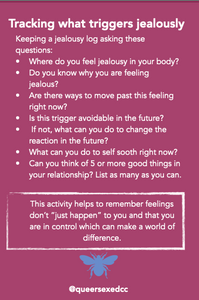Working Through Jealousy
- Queer Sex Ed CC

- Jan 29, 2021
- 4 min read
Updated: Apr 21, 2021
Jealousy, a feeling most of us have experienced yet we have so few skills to manage and discuss it. I cannot count the number of times that people have said to me, as a person who tends to have non-monogamous relationship structures “I wish I could, but I would never do what you’re doing, I’m too jealous.” This comment is one of the most interesting things to me about discussions of jealousy. Often, the way people frame jealousy is as a personality trait, a thing you “have” or “don’t have.” Jealousy like all other feelings is something you can work with and through. No feeling is stagnant, and you are not your feelings. If thinking you’re “just a jealous person” is the only reason you can’t engage in non-monogamy, I have some great news for you: Jealousy isn’t stagnant and we can work through it! I still experience jealousy with partners, and is it hard? Absolutely, but I have worked to create a toolkit of ways to manage and eventually work past my jealousy. Jealousy is not only relevant to those engaging in non-monogamy, in fact where I see jealousy show up a lot is in monogamous relationships. Jealousy can turn relationships toxic when it is used as a rationale to control the behavior of others. It is crucial to be able to differentiate between feelings of hurt and jealousy due to a breach in relationship agreements (for example, a partner having sex with someone else in a monogamous relationship) and a feeling of jealously rooted not in a breach of trust, but rather fear that trust will be breached, insecurities, or past experience.
Attempting to control a partner’s behavior due to jealousy, or any other reason is not healthy. To have healthy, positive relationships, we must accept that we cannot, and should not control others. Things like how someone dresses, the sexual media they consume, if they masturbate, healthy relationships with friends and family regardless of gender, are all things that can be discussed however ultimately we need to accept our partner’s agency and bodily autonomy. If your partner’s healthy relationships with friends bother you, it’s important to ask yourself why? Do you want to be spending more time with them? Are you worried you will be left for another? Are these things you can bring up with your partner in a healthy, non-guilt based way? Let’s explore that further this week!
Jealousy is often rooted in personal insecurities, anxieties, past experiences, and even trauma. Jealousy does not “just happen” and there is always a cause. It’s our job to make sure that we are working to address jealousy in our relationships to stop it from growing into resentment and form a basis for conflicts. To move past jealousy, communication and trust are essential.
Admitting that you’re feeling jealous is hard; there is a harmful stigma that feeling jealous is embarrassing or desperate. Jealousy can grow when it is stifled or repressed, which can lead to big reactions in response to small occurrences. Talking about feelings of jealousy can make those feelings much more manageable, and take away sensations of powerlessness or helplessness.
Societally, we hold a lot of misconceptions about jealousy, such as:
Jealousy is a valid reason to control a partner’s behavior
People who are non-monogamous do not experience jealousy
People “should not” feel jealous
Jealousy always means someone has breached trust/agreements
Jealousy means there’s someone to blame
Jealousy means you’re a bad partner
So what is the “truth” about jealousy?
That it is something to work on and through in order to strengthen ourselves and our relationships!
What can we do?
Remind yourself that you are not an emotion.
It can be useful to remind yourself that you are experiencing an emotion, instead of telling yourself that you are the emotion. Emotions come and go.
Try saying (to yourself or a partner): “I am experiencing the emotion of jealousy.”
Using “I” statements
The goal of expressing these feelings should be for your partner to hear you and think with you on solutions because they want to, not because they feel guilty. Speak about how you’re feeling, and try not to place blame on anyone for that feeling while expressing it. Bring a feeling to work through it, not to make someone feel guilty. Guilt is not productive to healing and improving in the future.
Examples:
I feel like my needs not being met are creating feelings of jealousy and resentment
I feel jealous of other people because we haven’t been spending much time together
I feel jealous of your other partners, can we talk about it more?
I feel like I haven’t been listened to about what I need recently
I am hurting and need to be heard
I don’t feel safe in our relationship right now
Managing Jealousy
Feelings are always valid, and that doesn’t mean they’re always rational. There’s never shame in asking for support in figuring this out!
Therapy/professional mental health care
Sometimes jealousy is rooted in past issues outside of our current partner(s). If you can’t work past your jealousy with a partner, maybe it is time to reach out to someone for mental health support to work past these issues on a personal level.
Support from a trusted person (always check in first)
It can be helpful to have someone to check in with who knows you, and your situation and can help you contextualize your feelings.
Tracking Jealousy Triggers
Keeping a jealousy log asking these questions:
Where do you feel jealousy in your body?
Do you know why you are feeling jealous?
Are there ways to move past this feeling right now?
Is this trigger avoidable in the future?
If not, what can you do to change the reaction in the future?
What can you do to self soothe right now?
Can you think of 5 or more good things in your relationship? List as many as you can.
As usual, please let us know what you think. What else are you wondering? Do you have any ways you work through jealously? Comment below and we can add it to our blogpost and resource guides!























Comments